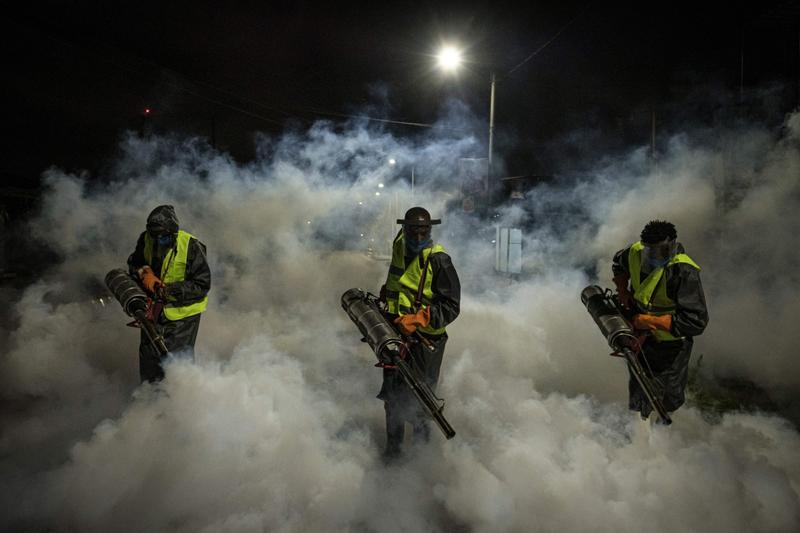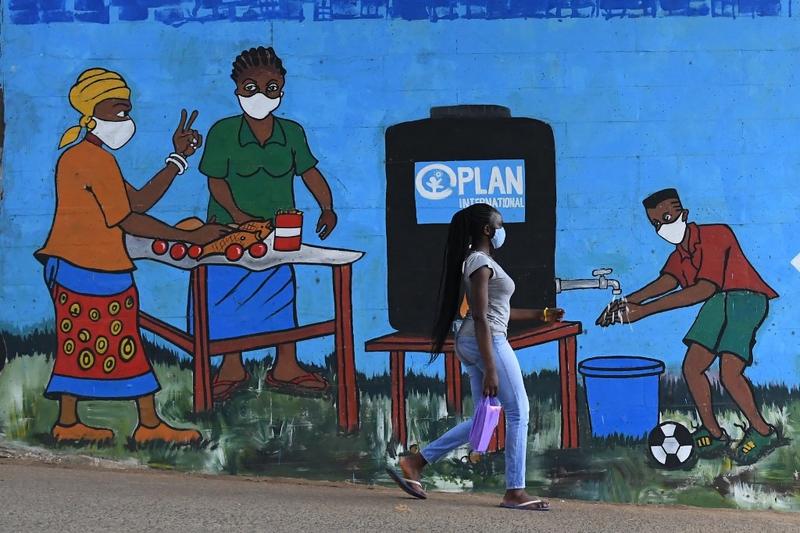 In this April 6, 2020 photo, volunteers from Sonko Rescue Team, an NGO privately funded by Nairobi Governor Mike Sonko, fumigate a street to curb the spread of COVID-19 during a joint operation with Nairobi county during curfew at a residential area in Nairobi, Kenya. (YASUYOSHI CHIBA / AFP / GETTY IMAGES / BLOOMBERG)
In this April 6, 2020 photo, volunteers from Sonko Rescue Team, an NGO privately funded by Nairobi Governor Mike Sonko, fumigate a street to curb the spread of COVID-19 during a joint operation with Nairobi county during curfew at a residential area in Nairobi, Kenya. (YASUYOSHI CHIBA / AFP / GETTY IMAGES / BLOOMBERG)
African countries have generally handled their coronavirus response better than many experts feared, except for one detail: Managing corruption.
With probes ongoing in several African countries, the extent of the plunder is still unknown, but is set to amount to hundreds of millions of dollars
Kenya is the latest African nation to have its politics shaken by allegations of graft in handing out pandemic-response contracts. It follows South Africa, Botswana, Zimbabwe and Uganda, which have all been rocked by scandals of their own.
Preliminary investigations show officials who’ve illicitly benefited largely adopted similar methods: Awarding contracts to companies owned by relatives or friends to supply medical equipment and services to the state at inflated prices in exchange for kickbacks. The relaxation of tender and procurement rules as governments rushed to prepare health systems for an anticipated influx of patients made it easier for funds to be misappropriated.
ALSO READ: 20 African countries shut borders completely to fight COVID-19
“Massive, and often yet-to-be-borrowed, funds have fallen prey to entrenched patronage networks,” said Robert Besseling, executive director of political risk advisory firm EXX Africa. “The implications of COVID-19-related state corruption may outlive the pandemic, as many African countries that are already struggling to repay or refinance loans have lost the confidence of investors and lending partners.”
With probes ongoing in several countries, the extent of the plunder is still unknown, but is set to amount to hundreds of millions of dollars. Tedros Adhanom Ghebreyesus, the director-general of the World Health Organization, articulated the public outrage that the profiteering has elicited in an online briefing last month.
“If health workers work without personal protective equipment, we’re risking their lives and that also risks the lives of the people they serve,” said Tedros, a former Ethiopian health minister. “It’s criminal and it’s murder and it has to stop.”
 In this Aug 13, 2020 photo, a woman with a face mask walks past graffiti that promotes hand washing and wearing face masks as preventive measures against the spread of the COVID-19 coronavirus, in Kibera, Nairobi. (SIMON MAINA / AFP)
In this Aug 13, 2020 photo, a woman with a face mask walks past graffiti that promotes hand washing and wearing face masks as preventive measures against the spread of the COVID-19 coronavirus, in Kibera, Nairobi. (SIMON MAINA / AFP)
30,000 deaths
Africa has had more than 1.2 million confirmed coronavirus cases so far, while more than 30,000 of those diagnosed with the disease have died, data from Johns Hopkins University show. Inadequate testing capacity on the world’s poorest continent means the actual tallies are likely far higher.
In South Africa, the authorities are probing suspect contracts worth almost US$300 million -- some awarded to companies established shortly after the outbreak of the disease and owned by high-profile politicians’ relatives. President Cyril Ramaphosa has likened those who had illicitly profited to hyenas and vowed to hold them account, but no-one has been convicted so far.
In Kenya, President Uhuru Kenyatta this week followed Ramaphosa’s lead in ordering details of all virus-related contracts to be published online after irregularities were uncovered at the Kenya Medical Supplies Authority.
In Zimbabwe, Obadiah Moyo was sacked as health minister in July after being charged in connection with the unlawful procurement of US$75 million worth of medical equipment. Virus-related scandals have also cost health officials in Botswana, Somalia and Uganda their jobs, and have implicated cabinet ministers in Malawi and the Democratic Republic of Congo.
READ MORE: Falling infection rates bring hope in Africa
There may be genuine reasons why spending controls may be too lax, including the need to take decisions and buy equipment quickly, but there’s also a risk that corrupt officials and suppliers could exploit the situation and get away with it, said Liz David-Barrett, director of the Centre for the Study of Corruption at the University of Sussex in the UK.
“The difficult part about a crisis is that it is much harder to differentiate corrupt behavior from the results of genuine mistakes and rushed decisions,” she said. “The most important thing a country can do is to make contracting transparent so that the people can still hold governments to account.”


